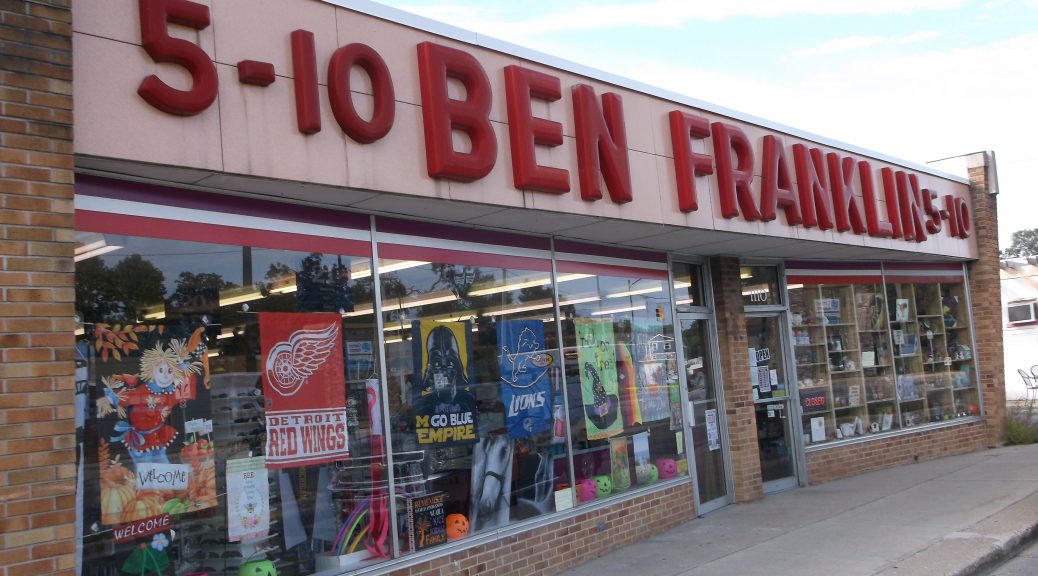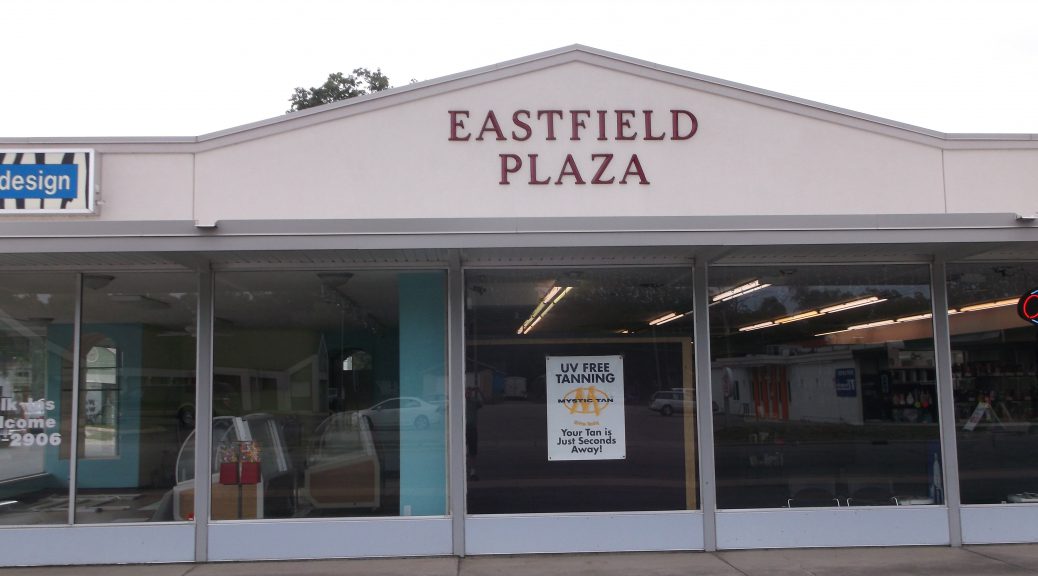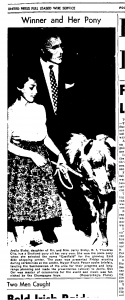
August 12, 1955 was surely one of the Joella Slaby’s happiest days. On that very day she received a pinto Shetland pony of her very own. With Don Orr as Master of Ceremonies and the Champaign Boys providing music, Mayor Frank Power presented the horse to young Joella, a reward for winning a contest to name the new shopping center at the corner of Eighth and Garfield. “Eastfield” had won her the pony!
Shopping centers—not called strip malls at this time—began to appear as automobile culture thrived in the twenties. Often a single large store would serve as an anchor with other smaller shops locating nearby. Parking was not a problem as it would be in congested downtown areas, and homes were constantly being built away from the city center, providing ready customers for a variety of businesses.
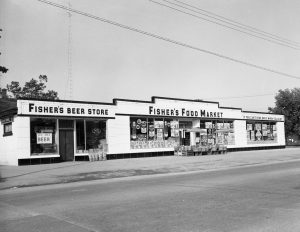
Still, a shopping center so far from Front Street businesses was a risky proposition. Successful grocer Jerry Oleson had warned Bob Fisher about the perils of building too far from town. Bolstered by his own studies of traffic flow, Fisher went ahead anyway, carrying out his plans to build a new grocery store at the Garfield and Eighth location. In 1947 Fisher’s Food Market was completed, a building with a white-paneled modern look which sported a friendly greeting above its front window, “If you can’t stop, smile as you go by.”
Bob Fisher had more buildings constructed for the shopping area and found plenty of tenants willing to locate in the sandy flatland at the edge of the city. By 1955 Plamondon’s Shoes, the Carpet and Bedding Shop, and Ben Franklin had moved in with more to come. Businessman Harold Akey put up the Eastfield Plaza building in 1952 with Don Orr’s hardware store coming in as first tenant. There would be a cascade of businesses to follow.
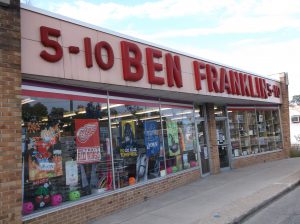
Attracting Ben Franklin was a coup for the growing shopping area. In 1955 more than 2000 stores nationwide carried the name. While not as well known as Woolworth or Kresge’s, the other “five-and-dime” stores of the era, it still carried on a lively business. Cindy Taylor, an employee of Traverse City’s Ben Franklin since 1975, remembers lines of customers waiting at the check-out counters. With the advent of Big Box stores like Walmart and Meijer’s, much of that traffic has disappeared, though the store still has many loyal customers.
Taylor pulls out a scrapbook of Ben Franklin and Eastfield photgraphs and newspaper articles. The store looked exactly as it did in 1955, proudly proclaiming “5 & 10” after its name, as if scorning the recent appearance of “dollar stores.” One newspaper clipping tells how modern the store came off in 1955—for one thing, it offered “self-service.” A relative novelty, self-service allowed customers the freedom to walk about the aisles and choose the items they wanted before bringing them to the clerk at the front of the store. Taylor pauses, looking up from the scrapbook, “Wait here,” she says, and disappears for a moment.
She comes back bearing a shopping basket made of metal, cloth, and wood, certainly a product of a different era with the attention paid to its construction. “These were what those shoppers used back in the fifties,” she says. “We have a bunch of them stored upstairs.”
By the early sixties, Eastfield was thriving. A new Laundromat opened, featuring new Frigidaire washing machines that could do the job in 18 minutes, as well as ultra-violet drying machines for “extra-fluffy, easy-to-iron clothes.” Blue Photo, in a complex west of the Garfield intersection, offered the latest in cameras and film finishing. Maria’s Pizzeria presented something new to those bold enough to try a supper made up of a crust smeared with tomato sauce and buried in melted cheese.
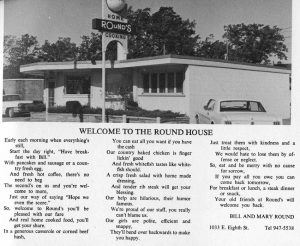
Eastfield was a city unto itself. It had Fisher’s for groceries, Fisher’s for beer and liquor, Ben Franklin for a small department store, Nichol’s for a drug store, Round’s Circle Inn for a dapper restaurant, the ultramodern Eastfield Laundromat and Bensley’s Cleaners for cleaning soiled clothing, as well as a host of stores for general shopping. Nichol’s served as a post office sub-station. A host of hair-styling studios and barbershops served the needs of nearby residents. Farmers coming into town didn’t need to go any farther than Eastfield on their shopping days.
How soon new things become old! One way of demonstrating that truth is to look at a website called Ngram viewer. Using a data base of ten thousand documents, the Ngram program can answer the question, “When did a word (or phrase) begin to be used?” For example, inputting the term “Laundromat” reveals that term only appeared after World War II, rapidly accelerating in usage after 1960—just the time that the Eastfield Laundromat was built. “Pizza” was hardly mentioned in written articles and books until after 1960. Indeed, Maria’s Pizzeria was at the cutting edge of popular taste. Even the “self-service” Ben Franklin’s Pete boasted about, only became a commonplace after the Second World War.
Merchants of Eastfield banded together to form an association to promote their shopping center. In 1955 members included Round’s Circle Inn, Blue Photo, Bill’s Barber Shop, Nichol’s Drug store, Curtiss Electric, Jan and Jeb Fashions, Ben Franklin, Morton Hardware, Joe Burns Pure Service, Bensley Drive-in Cleaners, Plamondon Shoes, and Fisher’s Market. The Association participated in the Heritage Parade in the Cherry Festival, and it sponsored teams in the girls’ softball league. Residents of Traverse City came to know the Eastfield Shopping Center as a vibrant, busy district of the town.
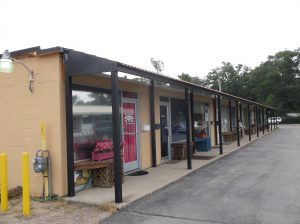
The area reached its commercial peak in the mid-sixties. Local architect David Stiffler designed a row a professional buildings at the east end of the district. Resembling a row of motel rooms, each one identical to the next with aluminum-framed front windows, it was filled with clients, many of them hairstylists, barbers, or offices that do not require much space. Rarely were there vacancies at this time.
But the halcyon days of summer for Eastwood did not last forever. Suburbs blossomed farther out from the city as many young families opted to live miles away from the city center. The population of Grand Traverse County doubled between 1950 and 1990, while the population of the city changed little. Giant malls appeared along Airport Road, first Cherryland Mall in 1976, then the Grand Traverse Mall in 1992. They offered huge anchor stores like K-Mart and Penney’s and an expanse of parking able to accommodate any number of automobiles. They were enclosed at first with visitors enjoying early summer warmth all year long. People didn’t want to drive to town if they could get what they needed closer by. Big Box stores arrived, first W.T. Grant’s in 1973 on US 31South, followed by Meijer’s at the same location. The forces that hurt downtown Traverse City merchants affected Eastfield in like measure.
Fisher’s left early, to be replaced by Eastfield Thriftway, a store lacking the style of its predecessor. Plamondon Shoes relocated to Front Street, where it stands today. By 1990 Eastfield True Value Hardware departed, along with Curtiss Appliances, both, no doubt, feeling the competition of larger retail stores outside the city limits. Ben Franklin hung on, remembering the busy days at its beginning, mostly converting to an arts-and-crafts store. While at first it was a proud member of a vast chain of stores nation-wide, by 2010 only about 200 stores carried the Ben Franklin name, most of them located in small towns. Starting out as a prime example of modern retailing, it had become a historical artifact.
This is not to say Eastfield became a desolate place with empty storefronts and run-down places of business. Ben Franklin is still known and patronized by local residents. The Eastfield Laundromat does vigorous business all year around. Rounds restaurant is as popular as ever and stores nearby still do well. The shopping center is hardly a failure, but it is fair to say the retail center of the Traverse City area has moved outside the city limits.
History is the story of change. Eastfield started out as a shopping center occupying the extreme outskirts of Traverse City. Jim Blue of Blue Photo (an early business of Eastfield) remembers his father saying that it did not even have city water and sewage at first. Then, scrubby oak lands surrounded businesses, but soon enough this isolated retail center would be swallowed up by the city, only later having to yield commercially to developments farther out on Airport Road and beyond. Its early grand success stood out as a memory. Events rarely turn out as one would have predicted at the outset.
Keeping this in mind, finally, we should ask, “Whatever happened to Joella Slaby and the Shetland Pony she received for naming Eastfield?” It turns out that piece of history went differently from what one might have expected, too. In a telephone interview she told me that the “pony” was scarcely that at all. It was a foal, perhaps not more than six months old and hardly ready for riding. Joella christened it, appropriately, “Victory,” and set about to train the animal—only that task proved exceedingly difficult. In the end, after a year of happy grazing at her Peninsula home, the pony was sold to another person. “Victory,” like Eastfield, enjoyed a moment in the sun, only to be followed by events no one could have predicted.
Richard Fidler is co-editor of Grand Traverse Journal.

